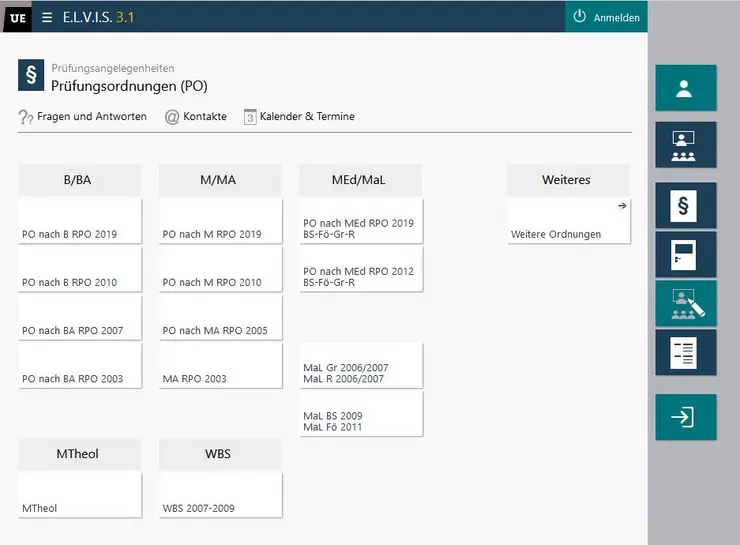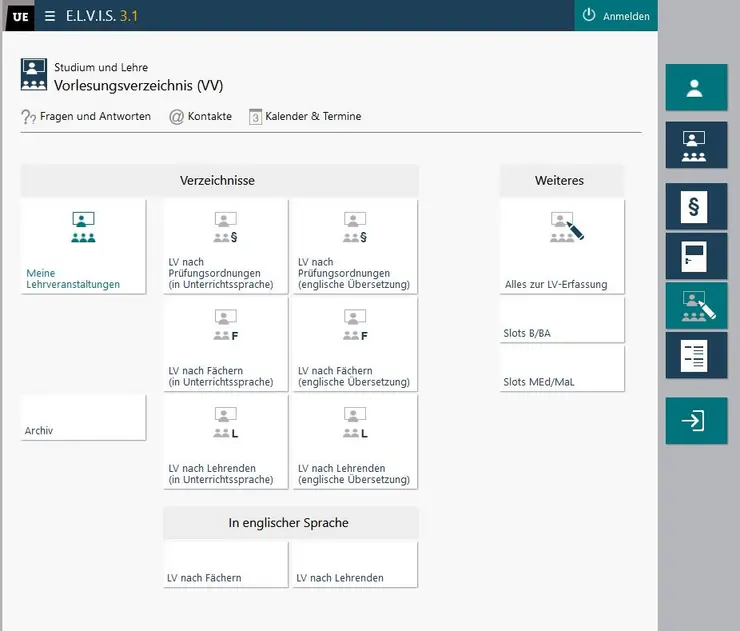The start of studies
Dear students,
welcome to the University of Erfurt! Here are a few brief, important tips for your start to your studies.
Important information for a successful start to your studies
Student Orientation Days (STET)

At the end of the Student Orientation Days, you will have your timetable for the first semester and you will know the content and course of your degree programme!
Teachers, students and Department 1: Registrar's Office (D 1: SuL) will make it as easy as
possible for you to start your degree programme. Your tutors in the bachelor's programme will show you around the university, the faculty buildings, the library, the language centre and the computer centre. You will get to know your first fellow students, with whom you will also explore the city.
Language skills
A command of foreign languages is required or recommended for individual subjects. The requirements can be found in the respective examination and study regulations.
Admission to language courses from level A 2.1 requires participation in language placement tests. These are offered by the Language Center in the two weeks before the start of lectures, i.e. also during the STET. The Language Center provides information on the following websites:
Registration for language courses at the Language Center
University and e-mail account, student ID card
Computer and e-mail account

With your matriculation, a computer account (your personal access to the university network) and an e-mail account (your mailbox at the university: ...@uni-erfurt.de) have been prepared for you, which you must activate. To do this, you will need your user name, which we have sent to the private e-mail account you specified during your application. If you have not yet received this e-mail, please check your spam/junk mail folder first.
The University Computer and Media Centre (URMZ) will send you an opening password and instructions for activating the accounts in the same way. Please also check your spam/junk mail folder here if necessary. If you were not able to activate your account at home, you should do so now at the latest, if necessary with the help of the computer centre.
Only after activation can you use the following services which are important for your studies:
- Your ...@uni-erfurt.de address,
- your W-LAN access Eduroam,
- the information and lending services of the University Library,
- the Moodle teaching and learning portal
- the examination portal Wiseflow during the examination period.
Via your study portal E.L.V.I.S.®, the Erfurt Course Information System, you can immediately find your certificate of enrolment and under My courses (course catalogue) all the courses that are set up for your studies in this semester.
Please use your university e-mail account for all your e-mail correspondence with the university. E-mails from other web accounts will be ignored by the University of Erfurt! You can access your e-mail account via webmail, for example via the navigation point "Quicklinks" at the top right of the website.
student advice and counselling
student advice and counselling
Student advice and counselling is offered by various contacts within the university, each with the appropriate skills. Don't be afraid to ask your questions, they will all be happy to help you.
- Mentoring: A mentor (Professor or academic staff of the main subject) is responsible for your academic advice during your studies. You either choose this mentor at the beginning of your studies or he/she is assigned to you. You will find out more about this during the STET.
You will discuss your personal study and course plan for the main subject with your mentor every semester. He/she will also be available to answer any questions you may have about planning your studies (focus, internship planning, stay abroad, etc.). - Subject advice: In addition, the subject advice and counselling service offers advice on subject-specific questions of the minor subject. This advisor will advise you on content, focal points, study and examination regulations, study and examination schedules, performance requirements and certificates and the crediting of previous academic achievements (e.g. in the case of a change of degree programme and/or university). An overview of the subject advice and counselling services valid for the current semester can be found here.
- Examination matters: Information on examination matters, examination regulations, sick notes, etc. as well as confirmation of already recognised achievements for the BAföG Office can be obtained from the Department 1: Registrar's Office at 0361/737-5100 or by e-mail, telephone consultation hours: Monday to Friday from 9 to 11:30 a.m.
- Student affairs: Information on application, admission, enrolment, change of subject, re-registration, leave of absence, long-term tuition fees etc. is available from Department 1: Registrar's Office, at 0361/737-5100 or by e-mail, telephone consultation hours: Monday to Friday from 9 to 11:30 a.m.
- General student advice and counselling: The general student advice and counselling service provides information and counselling on the various university programmes, helps you get started in your studies as well as with difficulties that arise in the course of your studies, and supports you in your entry into professional life. The University cooperates with the career counselling service of the Federal Employment Agency. Counselling is provided by Department 1: Registrar's Office, which can be reached at 0361/737-5100 or by e-mail, telephone consultation hours: Monday to Friday from 9 to 11:30 a.m.
- Diversity Officer: If you are studying with a disability/chronic illness, the Department 1: Registrar's Office will advise you on behalf of the Diversity Officer, in particular on compensation for disadvantages. These should be discussed at an early stage so that the university can react to them. Please inform yourself about this beforehand on the university's website. Appointments can be made by calling 0361/737-5100.
- Student Council (Student Council): Help in all student matters is also offered by the Student Council as the representation of all students enrolled at the university.
- Student representatives: If you have subject-specific questions, you can also contact your departmental student councils. They are the representatives of the students who are registered for a subject. The student council will represent your interests vis-à-vis the faculty. You can find an overview of the student councils existing at the University of Erfurt here.
Time and subject-related structure of the degree programme

Expected time expenditure per semester/LP
The university expects you to have an average study and examination load of 900 hours per semester in a full-time programme.
This is comparable to a full-time job of 40 hours a week. The expected effort is represented in 30 parts, the so-called credit points (LP). One LP is equivalent to 30 hours. This corresponds to the "European Credit Transfer System" (ECTS), i.e. one LP is also one ECTS credit. In the first year of study, courses with a weight of 3 LP are the rule, i.e. you can expect ten double-hour courses during the lecture period.
My first timetable
My first timetable
During STET, the tutors will support you in creating your timetable.
- You first have to find out in the examination regulations of your chosen major and minor subjects which modules you have to prove in order to successfully complete the orientation phase. This is specified within the examination regulations in the paragraph on the "Structure of Studies" (usually § 4 or 5).
- As a rule, a module is completed when the module examination has been passed or recognised. Which sub-modules must be attended in order to pass the module examination can be found in the module descriptions, which are attached to the examination regulations. A few modules are completed without an examination (MoP).
- Once you have determined for yourself which modules are to be completed with which sub-modules, you can then select the courses assigned to the sub-modules semester by semester under My Courses (course catalogue) and transfer them to your timetable, in particular with the sub-module identifier (e.g. M01#01).
Examination and study regulations, module descriptions
Examination and study regulations, module descriptions
You can always clarify all questions regarding your studies with your examination and study regulations (PO) as well as the module descriptions (module catalogue) and the Bachelor framework examination regulations (B-RPO) attached as an appendix. The examination regulations that apply to you are listed on your matriculation certificate, which you can access via E.L.V.I.S.. You can find this under My matriculation certificate.
The examination regulations refer to the framework examination regulations (B-RPO) applicable to your degree programme, which contain the regulations that apply to all Bachelor examination regulations. The coloured module lists serve as a table of contents and overview of the module catalogue. Red always indicates the module level and blue the submodule level.
Please print out your examination regulations and the module lists, as you will need them during the STET and throughout your studies!
Courses offered - Course catalogue
Courses offered - Course catalogue
You can find your courses for a semester under E.L.V.I.S.®: My courses(course catalogue).
Sorted by subject, module and sub-module, you will find all the information on the courses here. These
will also be updated until the start of the enrolment period.
Semester calendar (Dates)
Semester calendar
The semester calendar contains the most important dates for planning your studies.
Orientation phase (1st - 2nd semester)

Orientation phase
In the first year of study, the so-called orientation phase (O-Phase), you should
a) familiarise yourself with the examination system,
b) determine whether the subjects you have chosen meet your expectations and
c) prove yourself in the chosen subjects.
The module examinations of the O-Phase must be passed. Failed module examinations of the O-Phase can only be repeated once in the same semester in a second examination date. If these are successfully completed, there is nothing to prevent you from continuing your studies in the Qualification Phase (Q-Phase). You can change your major and/or minor subject once at the end of your 1st year of study. This is no longer possible in the qualification phase. Submit the application for a change of subject to Department 1: Registrar's Office.
Registration and attendance of courses

Registration and attendance of courses
Attendance at compulsory courses in the degree programme is guaranteed, while attendance at compulsory elective courses may be limited to a certain number of participants at
. In these cases, the faculties offer enrolment procedures.
You will be informed about this in the course catalogue or in the courses themselves. The lecturer decides on admission to the course in the first two sessions.
Registration, examination registration
Registration, examination registration
Once the registration for the selected courses has been clarified with the lecturer in the 1st and 2nd week, you must register via E.L.V.I.S.® at
within the 3rd and 4th week of lectures in order to register for the courses and module examinations. The enrolment process via E.L.V.I.S.® is explained in the STET. Please only submit your online enrolment once you have completed your enrolment planning, as this is binding and cannot be changed! Only if you have a reason for which you are not responsible can you submit an additional booking!
Module examinations and examination dates

Module examinations and examination dates
The lecturers will inform you about the module examinations and dates in the first two weeks of lectures. You should also enter expected tuition fees and their dates (Section 8 (4) B-RPO and Section 9 (4) M-RPO) in your timetable at the beginning of the semester. Module examinations are also scheduled during the lecture-free period! Please note that you will only be admitted to retake a module examination if you have attended the first examination date. According to the framework examination regulations, examiners are obliged to enter module examination grades, i.e. if applicable also the grades of the repeat examination, in E.L.V.I.S.® by the beginning of the lecture period of the
summer semester or by the end of the first half of the lecture-free period after the summer semester at the latest.
Deceiving during your studies
Deceiving during your studies
The University of Erfurt sanctions attempts to cheat in examinations. The measures enclosed in the brochure as Appendix 2) have been adopted across all faculties. You will be warned the first time you attempt to cheat! Even the second attempt at cheating will result in the loss of your examination entitlement and thus the end of your studies at the University of Erfurt!
Illness during examinations and events with compulsory attendance
Illness during examinations and events with compulsory attendance
If you fall ill and it is foreseeable that you will not be able to take part in a scheduled examination or meet the deadline for a written examination due to illness or if you miss a course that requires attendance due to illness, you should consult a doctor immediately. This doctor can confirm your inability to take an examination due to illness on the form you have pre-filled out .
You must send the application with the doctor's confirmation immediately either to the University of Erfurt, D1: SuL, Nordhäuser Straße 63, 99089 Erfurt or as a photoscan to pruefungsangelegenheiten@uni-erfurt.de. You can also use the in-house letterbox at the main entrance to the university to send your notification by the deadline. The notification of illness must generally be received within three working days (Monday to Saturday). The decisive factor for timely receipt is not your examination, submission or course date, but the time at which the inability to take an examination due to illness is determined.
Your absence will only be excused if your application is received on time. If you are hospitalised, a certificate of hospitalisation from the hospital will suffice as proof. If you are unable to attend an examination due to caring for your sick child, the "Medical certificate for the receipt of sickness benefit in the event of illness of a child" is sufficient. Please also attach the form mentioned above, as your personal details are required for processing.
You and your examiners as well as the lecturers of the courses you have taken in the current
semester will be informed by email of any excused absences. If an examination was due during the period of the excused absence, the examiner at
will set a new examination or submission date. The so-called "certificate of incapacity to work for submission
to the employer" is generally not sufficient as a credible reason for an excuse!
Re-registration (semester contribution)

re-registration
To continue your studies, you must re-register semester by semester. In particular, you must pay the fees, contributions and charges associated with your studies. You will be informed of the exact amount by e-mail at the beginning of the re-registration period. Receipt of payment is deemed to be an application for re-registration.
Re-registration deadline:
- Summer semester from 1 January to 15 February
- Winter semester from 1 June to 15 July.
The date of receipt of the money on the University of Erfurt's account is decisive for re-registration on time, not the order date of the transfer. Please note that even in the case of a real-time transfer, a bank processing time must be planned for, especially if it is at the weekend or on a public holiday. In case of late receipt of money, a late fee of 20 € will be charged.
Once payment has been received in full, you will receive an e-mail stating that you have been re-registered and that you can print out your enrolment certificate under E.L.V.I.S.. You will also need to extend the validity period of your thoska (student identity card) at the validation machines provided.
E.L.V.I.S. study account
E.L.V.I.S. Study Account
When you enrol, courses and module examinations are shown in your E.L.V.I.S. study account via "My grades". Towards the end of the semester, you can also call up your grades here.
Stay abroad
Stay abroad
The University of Erfurt recommends studying abroad for one semester on the bachelor's programme. The 5th semester is best suited for this. You should start planning this in your first year of study. Information on cooperation agreements with foreign universities, exchange programmes, special features of foreign study systems, application modalities, language requirements as well as possibilities for financial support can be obtained from the International Office of the University of Erfurt, administration building, VG | 0.36, on 0361/737- 5030, or by e-mail: international@uni-erfurt.de or at www.uni-erfurt.de/international.
Internship in the Bachelor's programme
Further information
Discrimination and harassment
Personality, respect for every person and consideration of their dignity are of central importance to the University of Erfurt. Discrimination on the basis of gender, ethnic or social origin, age, disability, sexual orientation, identity, religion, ideology or political views must be avoided. Behaviour that respects the personality of others is valued.
In the event of discrimination, (sexual) harassment and/or violence, you as the person affected, involved or observing can contact the following offices within the university in particular:
a) Department 1: Registrar's Office,
b) International Office,
c) Equal Opportunity Office or
d) Student Council.
These offices offer confidential support and advice on protection and action options.
Maternity protection, parenting and studying
As an expectant mother, you are subject to special legal protection, which also applies during your studies. Please notify us in good time of your (expected) delivery date using the following form . You will receive individual advice on this special study situation from Department 1: Registrar's Office.
Maternity protection during studies
Balancing parenting and studying is associated with many difficulties and hurdles. The University of Erfurt has therefore
set itself the task of supporting you as much as possible. At the University of Erfurt, the Equal Opportunity Office and Department 1: Registrar's Office are available to advise you.
Semester ticket - Germany student ticket
By paying the semester contribution, you have acquired the authorisation to order the Germany semester ticket via the homepage of the Verkehrsverbund Mittelthüringen (VMT) dst.vmt-thueringen.de. You must have activated your university account beforehand. After ordering, you will be able to access the ticket from 1 October at the latest.
You can find an overview of the options for using the DST at Semesterticket.
Foundations/scholarships
The organisations for the promotion of gifted and talented students award scholarships to students who demonstrate above-average performance as well as social commitment. They reflect the various ideological, religious, political, economic or trade union-orientated currents in Germany. You can find the liaison lecturers of the various foundations, whom you can contact for scholarships in particular, under Begabtenförderungswerke | Vertrauensdozent*innen.
Educational support (BAföG)
Application forms and information leaflets on educational support are available from the Office for Educational Support (BAföG-Amt) of the Thuringian Student Services Organisation (Studierendenwerk). You will find the BAföG office on campus in:
Staff Building 1 (high-rise building, ground floor)
Nordhäuser Str. 63, 99089 Erfurt
Tel.: 0361/737-1853
or on the Internet at: Federal Training Assistance Act (BAföG).
In the glass box at the main entrance to the university, you can also get advice on all questions relating to student funding and BAföG applications from the Service Office of the Office for Educational Support. Coffee to go is available next door. As educational grants are not paid retroactively, you should have submitted your application by the start of your studies, by 31 October at the latest.
Dormitory place
The Thuringian Student Services Organisation (Studierendenwerk) manages residential homes. Information on available places, dormitory locations, rents etc. can be obtained from the Student Housing Department. The application for a place in a hall of residence is made online.
Main or secondary residence in Erfurt
For secondary residences, the city of Erfurt levies a secondary residence tax of 16% of the net rent, which is waived when you register your main residence. You should register your flat or room in Erfurt as your main or secondary residence at the Citizens' Service Office, Bürgermeister-Wagner-Straße 1 (near the main railway station)
in 99084 Erfurt.
Examination system of the RPOs
Examination system of the RPOs
The framework examination regulations of the University of Erfurt for the B/M/MEd degree programme (RPOs) contain an examination system that is based on the terminology generally used in examination law. The following terms are used:
The degree programme is completed with the Bachelor's/Master's examination . This consists of one or more subject examinations. The subject examinations in turn consist of module examinations during the course of study, including a final thesis (Bachelor's or Master's thesis). The Bachelor's/Master's examination is passed if the subject examinations are passed. A subject examination is passed if the module examinations to be taken for the qualification/Master's phase have been passed and the academic achievements of the modules without examinations (MoP) have been proven. A module is successfully completed if the module examination is passed with a grade of 4.00 or better. Only module examinations that have been successfully completed can be taken into account when determining whether the requirements of a phase have been fulfilled.
The module examination (e.g. Section 9 (3) B-RPO), i.e. a written examination or an oral/practical examination or written work or an oral/practical examination (50%) in conjunction with written work (50%) or a final thesis, must be passed with a grade of 4.00 or better.
In the event of failure, the module examination can be repeated once. There is a grade for the module examination (e.g. § 11 Para. 2 B-RPO). The credit points of a module serve as a weighting factor when calculating grades, which are multiplied by the module grade in the grade calculation. The term examination refers to the individual specific examination procedure (e.g. an oral/practical or written examination). An examination is assessed and graded (e.g. Section 11 (1) B-RPO). If a module examination consists of only one examination, the examination and the module examination are identical. If a module examination consists of a composite examination, the grades achieved in the individual examinations are combined into one grade (= module grade) in accordance with the percentage stipulated in the examination regulations (e.g. Section 11 (2) B-RPO), whereby a lower grade, even a "poor" grade (i.e. a grade of "insufficient") can be compensated for by a better grade. As all examinations within the module examination relate to the same module, compensation for poor results in one type of examination (e.g. written examination) is justified by good results in another type of examination (e.g. oral/practical examination).
Tuition fees are paid in connection with courses. A course contribution can also include an assessed - but not necessarily graded - individual achievement, e.g. pass or fail. The RPOs and the examination regulations regulate coursework in particular in cases where they are preliminary examination work . An examination prerequisite is an admission requirement for a module examination, i.e. the module examination can only be taken if the coursework to be completed as an examination prerequisite has been proven. The examination prerequisite is generally not included in the respective module grade.
Joint specifications of the examination boards of the University of Erfurt on dealing with cheating attempts during studies
Joint specifications of the examination boards of the University of Erfurt on dealing with cheating attempts during studies
1. in every degree programme, students in their first semester must be informed by the subjects offering the programme about the principles of academic ethics, in particular about citing external sources and the use of unauthorised aids and their consequences (cheating). General information on how to deal with attempts at cheating is provided in the Student Orientation Days (STET).
2. detection and notification of attempted cheating in an examination:
- a) Attempted cheating in an examination shall be assessed as "insufficient" by the examiner. Every attempt to cheat must be confirmed on record by a second authorised examiner.
- b) Attempted cheating must be reported by the examiner in E.L.V.I.S. under: My examinations/course/candidate/"Note" as "Cheating". The facts of the case must be briefly described and explained and it must be noted who confirmed the accusation of cheating. (e.g: Use of unauthorised aids, namely ..., confirmed by ....).
- c) Based on the notification of cheating, the examination board issues a notification of cheating with information on legal remedies, a copy of which is sent to the student and the examiner. New colleagues and adjunct lecturers in particular will be informed of this by their subject at the beginning of each semester.
3. notification of cheating in the case of a first attempt at cheating:
- a) The notification of cheating by the examiner, confirmed by a second authorised examiner, is confirmed by the examination board by means of a notification.
- b) The student will be informed that a further attempt to cheat may result in the permanent loss of the right to take examinations in the degree programme. The loss of the right to take examinations is associated with deregistration from this degree programme. If the student is still entitled to retake the examination after the first attempt to cheat, the examiner must allow the student to retake the examination. The student may lodge an appeal against the decision with the President or for the record in Department 1.
4. notification of cheating in the case of a repeated attempt to cheat:
A repeated attempt to cheat is considered a "serious case" which, as a rule, excludes the candidate from all further examinations in this degree programme. The determination of a repeated attempt at cheating is submitted to the responsible
examination board together with the examination file including the grade report and a draft decision withdrawing the candidate's entitlement to take examinations in this degree programme as a whole. The notification confirming a repeated attempt at cheating will be forwarded to the student and a copy to the examiner without delay. The student may also lodge an appeal against this decision with the President or for the record in Department 1. If the candidate has not yet been heard by the examination board, this must be done first in the appeal procedure. Until a decision has been made on the objection or, if applicable, a complaint, the continuation of the examination entitlement is subject to suspensive effect. If no objection is lodged, the withdrawal of the examination entitlement is associated with deregistration in this degree programme, usually at the end of the semester.
You can find even more information for your start to your studies on the page "Info for first semester students".
To help you prepare for your studies, we have prepared a checklist for your orientation. You can hardly wait, so why not start with the checklist "Before the Student Orientation Days"?










